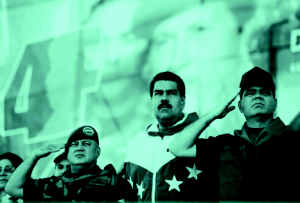
Venezuela and the Predicament of Rentier States

Prensa Miraflores, The New Politics Papers, Transnational Institute’s Public Alternatives Project
Much is said about Venezuela and its current state, but often in isolation from processes occurring in other Latin American countries and the world.
At the same time, it’s important to avoid reducing the current crisis to solely external factors. Many elements thereof are indeed purely Venezuelan and have contributed to one of the harshest crises Latin America has ever seen. Which, in itself, speaks to the situation’s severity.
It is no secret that Latin America is a continent marked by social and economic inequality.
Venezuela is no exception to the rule. As many of Latin America countries opened their economies to capitalism after World War II, and in the context of the Cold War, it exacerbated preexisting inequalities, especially as foreign investment arrived without proper democratic institutions to provide balance. As a result, this led to social unrest and to the arrival of political insurgencies, which were violently repressed by the Venezuelan dictatorship in the middle of the 20th century. Despite that this movement failed, it changed values in the country to be more left-leaning, anti-capitalist, and fearful of foreign investment, which was only seen as benefitting the country’s elites.
The external factors are easiest to explain.
Venezuela was blessed with a huge amount of oil, arguably the most coveted resource in the wake of the second industrial revolution in the late 19th century. However, instead of using it to jump-start its industrialization like the United States, or save it, like Norway, for strategic purposes, Venezuela became a rentier state. Rentier states are those which have an abundance of valuable natural resources, like oil, which they sell in the foreign markets for huge profits.
Rentier states also tend to have authoritarian governments.
These use part of the profits they make from exporting natural resources to provide welfare services to their population, all with extremely low taxes. As a result, any social unrest an authoritarian state might normally provoke is suppressed by the low taxation and decent state services. In addition, the state uses its profits to develop oppressive apparatuses to crush opposition that may rise against it, maintaining the status quo, and not industrializing.
Venezuela is hardly alone in this respect; nearly all Organization of Petroleum Exporting Countries (OPEC) member states, plus Russia, qualify as rentier states.
Saudi Arabia is a prime example as it provides services to its population, even giving away money, all while repressing its opposition and making few efforts to develop its domestic economy. It also explains the sudden collapse of Venezuela’s economy when the price of oil dropped from $100 per barrel in 2014 to less than $40 per barrel in 2016. As the commodity financed the whole Venezuelan economy, the collapse was inevitable.
When a rentier state is unable to provide services it used to provide, social unrest rises and the state must take measures to contain it, increasing state repression and brutality, often coupled with disastrous economic policies that freeze prices and the supply of goods and services requisite to the wellbeing of its population. Not long thereafter the main worry for the population shifts from daily crime and insurgency groups to state oppression and violence.
Rentier states are dangerous.
They engage in the oppression of their populations and are often responsible for state-sponsored terrorism on a global scale. Even when they focus on internal repression, it usually resembles a Robespierrian terror rule. These states are dangerous to their populations, to other states, and they finance global terror worldwide – Iran is a chief example. Their racket, providing welfare-like services to the populace without taxation is susceptible to failure and can plunge nations into chaos, as seen in Venezuela, and even civil war.
The international community should act to mitigate such disasters.
It could facilitate their entrance into international organizations, incentivizing development and domestic, industrialization of their economies, facilitating entrance into the global economy, and intervening, with sanctions on the UN Security Council, for example, to stop such states from terrorizing their populations. Thus, not only will this halt worldwide human rights violations, it will increase rentier states’ accountability to their populations, reducing their ability and incentive to fund terror organizations.
~ Roberto Malta is a Brazilian born, George Mason University student pursuing a B.A. in Global Affairs, with minors in History and Economics
